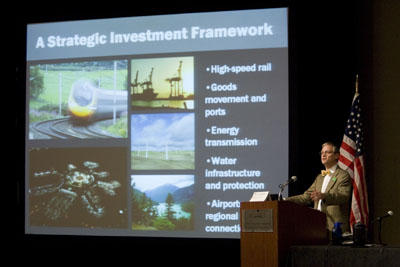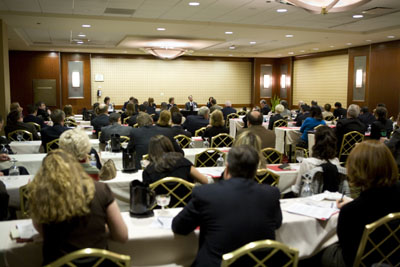Investment in our nation's water, energy, and transportation infrastructure will be one of the first priorities of the new Obama administration. At MPC's recent conference on the subject, experts from throughout the Great Lakes megaregion identified priorities and outlined a better process for making investment decisions.
Some
250 infrastructure experts from the Great Lakes region and greater U.S.,
gathered Nov. 17 in Chicago for “Rebuilding & Renewing America,
Infrastructure Choices in the Great Lakes Megaregion,” an
America 2050 Forum, co-hosted by MPC and New York’s Regional Plan Association.The day’s
agenda is available for download,
audio recordings of the featured speakers and break-out sessions also are
online
, courtesy
of Chicago Public Radio.

Speakers called for a national infrastructure overhaul and, with participants, began
to identify megaregional investment priorities. Featured speakers included
Anne Pramaggiore, executive vice president for ComEd; U.S. Reps. Earl
Blumenauer (D-Ore., pictured above) and Thomas Petri (R-Wis.); and the Hon. Peter
Gordon MacKay, Canadian Minister of National Defense and the Atlantic Gateway. They all
placed a resounding emphasis on the importance of funding the most needed, but
not necessarily the most exciting or easiest, projects – both for the sake of
the economy and the environment.
Perhaps more importantly, they cited the need to reform the process by
which infrastructure investment decisions are made. By linking investment decisions with
national and regional goals – for instance, congestion relief, climate change
mitigation, water conservation, and improving quality of life – and setting
objective criteria for rating projects against each other, the U.S can start to
make better decisions for a more economically and environmentally sustainable
future.
During break-out sessions,
panelists representing the public, private and nonprofit sectors further
defined challenges and priorities facing three of the megaregion's
infrastructure issues:
Water: Panelists emphasized the need to
promote water efficiency and conservation, and emphasized that water-related
infrastructure is badly in need of repair and modernization, and needs to be
included in any national infrastructure plan. They called for stronger
leadership at the state, regional and national levels, and cooperation across
these levels of government, particularly to achieve funding goals. They also
suggested expanding green infrastructure projects, and incorporating water
conservation into climate change policies.
Energy: Panelists
discussed current programs such as Chicago's Climate Action
Plan and the Illinois Smart
Grid Initiative
, which both aim to
increase energy efficiency while addressing climate change. Speakers also
touched on emerging renewable energy industries, how to expand wind energy
systems, and the role of public-private partnerships in energy production and
distribution. While the
infrastructure demands for wind and biofuels expansion are very different,
substantial investment is needed to expand those markets.
Transportation: The panel (pictured
below) identified theGreat Lakes megaregion’s most pressing transportation needs and
federal transportation policies that must be adapted by the new Obama administration
to better meet these needs. Panelists agreed the current system reflects
20th Century approaches to land use and urban sprawl,
lacks a focus on metropolitan areas (home to the vast majority of the U.S.
population), and is based on consumption (as opposed to conservation). Panelists
saw opportunities for creative collaboration between the federal government,
state agencies, and metropolitan areas, and proposed amendments to current
funding policies.

At all the break-out
sessions, panelists bemoaned the lack of collaboration between federal,
state and municipal governments. A lunchtime panel of regional Metropolitan
Planning Organization (MPO) leaders picked up on this theme, calling
for more direct financing of MPOs by the federal government, increasing
coordination between MPOs, and an evolution of the MPO structure to better
coordinate transportation, housing, land use, and environmental investment.
After the
conference, guests enjoyed a screening of Liquid Assets, a documentary that
explores the history, engineering, and political and economic challenges of
the nation's water infrastructure. Stephanie Ayanian, the film’s producer and
director, gave a special presentation about the making of the film and a final
word on the need for infrastructure improvements.
MPC and
RPA are grateful to the conference’s major funders: the Rockefeller Foundation,
Surdna Foundation, and Lincoln Institute of Land Policy. Local sponsors of the
conference and the film screening were the American Society of Civil Engineers,
Builders Association, Christopher B. Burke Engineering, Ltd., CN, Illinois
American Water, Illinois Railroad Association, and NIPSCO.
For more information on MPC’s
work in this area, please contact Josh Ellis at (312) 863-6045 or jellis@metroplanning.org.
* This article was
written by MPC intern Elizabeth Frantz